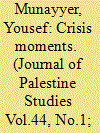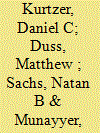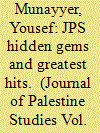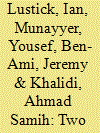| Srl | Item |
| 1 |
ID:
136598


|
|
|
|
|
| Summary/Abstract |
Discourse and public opinion on the question of Palestine—and every other issue for that matter—are largely shaped by themainstreammedia. Palestine remains remote for the average American consumer of information who is generally less concerned with foreign affairs than with the domestic issues that directly impact daily life. In moments of crisis, however, media coverage of Palestine increases significantly, sometimes to the point of saturation. Such “crisis moments,” despite being few and far between, can have a significant and lasting impact on shaping public opinion, rendering it critically important to understand and analyze the coverage of Israel’s latest assault on Gaza—as well as the discourse surrounding the issue.
|
|
|
|
|
|
|
|
|
|
|
|
|
|
|
|
| 2 |
ID:
136184


|
|
|
|
|
| Summary/Abstract |
There have been six Nobel peace prizes given for the Arab-Israeli conflict. In 1950, Ralph Bunche got it for negotiating the armistice. In 1978, Anwar Sadat and Menachem Begin received it for negotiating Camp David. In 1994, Arafat, Rabin and Peres got it for negotiating the Oslo accords. Then Carter got a Nobel Prize in 2002 for a variety of reasons, including the work that he did on the Arab-Israeli peace talks.
|
|
|
|
|
|
|
|
|
|
|
|
|
|
|
|
| 3 |
ID:
178339


|
|
|
|
|
| Summary/Abstract |
In this essay, Yousef Munayyer reflects on the politics of contentiousness through the lens of dissent and repression. He singles out Naseer Aruri’s “Resistance and Repression: Political Prisoners in Israeli Occupied Territories” (1979) as a JPS “hidden gem” and Gene Sharp’s “Intifadah and Nonviolent Struggle” (1989) as a “greatest hit.” Aruri’s piece, which has not garnered as much visibility as Sharp’s, pinpoints the ways in which political imprisonment, torture, and the weaponization of the law, as well as extraterritorial jurisdiction, are wielded by Israel as instruments of political repression. The “greatest hit,” by the late contemporary theorist of nonviolence Gene Sharp examines the Palestinian national movement’s resistance strategy eighteen months into the First Intifada.
|
|
|
|
|
|
|
|
|
|
|
|
|
|
|
|
| 4 |
ID:
126915


|
|
|